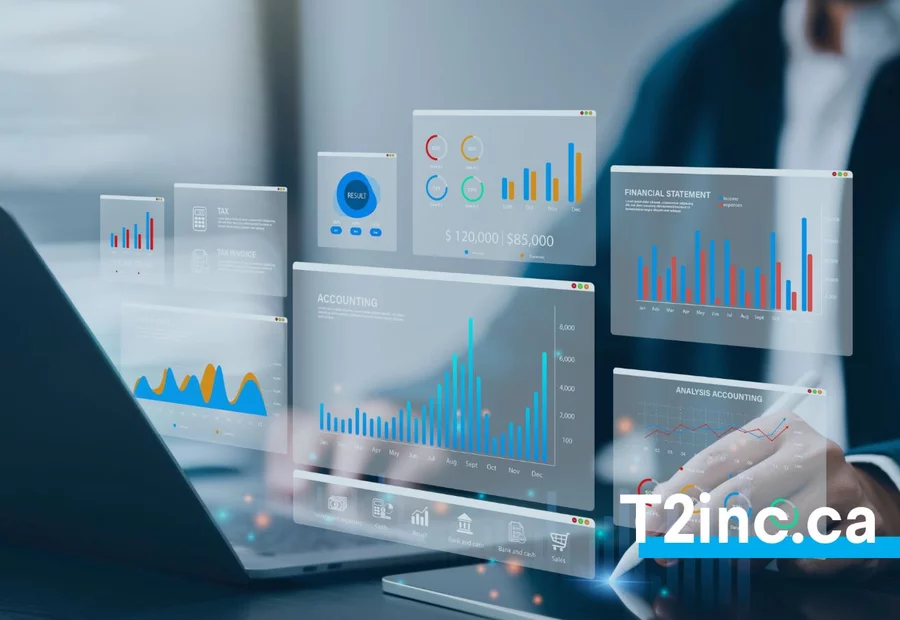Accountant vs. tax professional for your business: Which professional should you choose in Canada?

Managing your business's financial and tax matters in Canada requires expertise and precision. While some business owners prefer to handle their bookkeeping independently, others seek the help of an accountant or business tax specialist to manage corporate tax obligations, preparing and filing income tax returns, and maintaining accurate financial documents. Understanding the key differences between an accountant and a tax advisor will help you choose the right professional for your financial and tax management needs.
Whether you need accurate accounting oversight or strategic tax management, understanding their roles will help you reduce your tax burden and ensure compliance with the Income Tax Act.
What is an accountant? Definition and Role
An accountant is a qualified professional who is responsible for managing the accounting, financial documents and records of a business or individual. Their role includes recording financial transactions, overseeing the preparation of financial statements, and ensuring compliance with Canadian tax requirements. A good accountant provides a clear picture of a company's financial health and helps business owners make informed decisions.
A Chartered Professional Accountant (CPA) in Canada has in-depth knowledge of tax laws and advanced qualifications. They can perform complex tasks such as tax reports, verifying accounting practices, and supporting businesses during a tax audit. Unlike a general accountant, an accountant CPA can ensure that financial documents and past tax practices comply with Canadian regulations, including the Income Tax Act.
If you want to understand how to choose the ideal accountant for your business, read our article "How to choose an accountant for your business" for practical advice on how to make the right choice for your needs.
Example: The services of an accountant can help an SME prepare its financial statements and ensure that they comply with the applicable accounting standards (Accounting Standards for Private Enterprises (ASPE) or International Financial Reporting Standards (IFRS)).
Key responsibilities of an Accountant:
- Bookkeeping services: Recording transactions and managing cash flow.
- Preparing Financial Statements: Balance sheets, annual financial statements, and monthly financial reports.
- Filing Income Tax Returns: Calculating and filing income tax returns with tax authorities such as the CRA and Revenu Québec.
- Payroll Management: Processing employee paychecks and ensuring compliance with payroll tax regulations.
- Financial Analysis: Evaluating financial data to support business decisions.
What is a tax advisor? Definition and Role
A tax specialist is a corporate tax expert whose primary responsibility is to optimize a company's tax burden on minimizing tax liabilities while ensuring compliance with Canadian tax laws. Unlike an accountant, who handles day-to-day accounting or tax tasks, a tax advisor develops strategies to reduce your tax burden and maximize deductions.
A tax advisor has an in-depth knowledge of tax laws and the Income Tax Act, including federal and provincial regulations. They analyze financial documents and business structures to identify tax deductions, tax credits, and areas of tax savings.
Tax advisors also provide tax audit support and act as intermediaries between businesses and tax authorities, representing clients during tax audits and compliance reviews. He advises on the legal and financial structuring of the business, for example by recommending the incorporation or establishment of a trust to reduce the long-term tax burden.
For example, a technology company invests in research and development (R&D) to create new software. A tax specialist helps it obtain the federal SR&ED tax credit and the Quebec R&D tax credit, thereby reducing its costs. He also ensures that the T2 federal tax return and the CO-17 Quebec tax return comply with the applicable tax rules.
Key responsibilities of a tax specialist:
- Strategic Tax Planning: Developing strategies to legally minimize tax liabilities.
- Tax Return Optimization: Identifying eligible tax credits and deductions.
- Interfacing with Tax Authorities: Representing companies during audits and compliance reviews.
- Business Structure Advice: Recommending incorporation or trusts for long-term tax optimization.

The tax accountant: Combining the skills of accountants and tax specialists
A tax accountant combines the expertise of both an accountant and a tax advisor, offering comprehensive financial and tax management services. This versatile role is ideal for businesses seeking a qualified accountant who can handle bookkeeping, prepare financial documents, and provide tax audit support.
Key differences between a tax advisor and an accountant
The main difference between an accountant and a tax specialist lies in the scope of their skills. The accountant is responsible for the overall management of the company's finances, while the tax specialist focuses on the tax aspects in order to optimize the company's situation and minimize its tax obligations.
| Criteria | Accountant | Tax Advisor |
|---|---|---|
| Main Objective | Managing daily financial operations and ensuring tax compliance | Minimizing tax liabilities and maximizing tax savings |
| Core Responsibilities | Bookkeeping, preparing financial statements, payroll, filing tax returns | Tax planning, optimizing tax returns, tax compliance, providing tax advice |
| Approach | Operational: Organizing and managing business finances | Strategic: Developing tax strategies to minimize tax obligations |
| Key Knowledge | Canadian accounting standards (ASPE, IFRS), financial management | Canadian tax laws and regulations, business tax, and complex tax issues |
When to hire a bookkeeper for your business
An accountant can step in at different times of the year to ensure the proper management of your business accounting. They can handle recurring tasks such as recording financial transactions, tracking invoices, or managing payroll to ensure accurate accounting. If you manage your own accounting, delegating these responsibilities to an accountant not only reduces the workload, but also ensures compliance and reliability of financial data.
When to hire a tax professional for your business
One of the most common reasons for consulting a tax professional is to prepare your business taxes. These returns require rigorous accuracy and in-depth knowledge of tax rules. This professional will ensure that all applicable tax deductions and credits are identified and used to your advantage. This saves you money while avoiding costly mistakes that could result in penalties or delays in processing your return.
Understanding the differences between accounting vs tax expert in Canada
Accounting and tax services focus on different but complementary aspects of financial and tax management. While accountants ensure accurate financial documents and compliance with tax requirements, tax professionals help businesses optimize their tax impact and minimize liabilities.
At T2inc.ca, our team of accountants and tax advisors collaborates to provide comprehensive tax services. Whether you need to file a corporate tax return, optimize future tax strategies, or ensure compliance with the Income Tax Act, our qualified tax professionals are here to help.
Take Action Today! Contact us to choose an accountant or tax specialist who can meet your business’s financial and tax needs in Canada.
- What is an accountant? Definition and Role
- What is a tax advisor? Definition and Role
- The tax accountant: Combining the skills of accountants and tax specialists
- Key differences between a tax advisor and an accountant
- When to hire a bookkeeper for your business
- When to hire a tax professional for your business
- Understanding the differences between accounting vs tax expert in Canada
Contact our experts
Have a question? Need help? Fill out our online form to get help from our experts.
Contact usNeed more help?
Contact us by filling out our form
Are you interested in our services, but would like more information before taking the plunge? Contact us today and one of our tax accountants will be in touch to help you.
At T2inc.ca, we're committed to helping business owners manage their company's tax affairs so they can grow their business.




